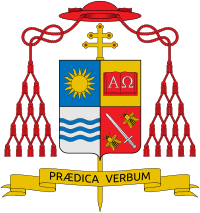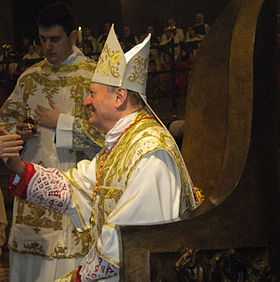Gianfranco Ravasi
| His Eminence Gianfranco Ravasi | |
|---|---|
| President of the Pontifical Council for Culture | |
 Cardinal Ravasi in 2012 | |
| Appointed | 3 September 2007 |
| Predecessor | Paul Poupard |
| Other posts |
|
| Orders | |
| Ordination |
28 June 1966 by Giovanni Umberto Colombo |
| Consecration |
29 September 2007 by Pope Benedict XVI |
| Created Cardinal | 20 November 2010 |
| Rank | Cardinal-Deacon |
| Personal details | |
| Birth name | Gianfranco Ravasi |
| Born |
18 October 1942 Merate, Province of Lecco, Italy |
| Nationality | Italian |
| Denomination | Roman Catholic |
| Previous post |
|
| Motto |
Praedica Verbum (Preach the Word) — 2 Timothy 4:2 |
| Coat of arms |
 |
Gianfranco Ravasi (born 18 October 1942) is an Italian prelate, a cardinal of the Catholic Church. He currently serves in the Roman Curia as President of the Pontifical Council for Culture. On 20 November 2010 Ravasi was created cardinal by Pope Benedict XVI. Cardinal Ravasi was named in the press as a likely papabile for election to the Papacy after Pope Benedict XVI announced his resignation due to ill health.[1]
Biography
Early life
The oldest of three children, Ravasi was born in Merate, Province of Lecco. His father was an anti-fascist tax official who served in Sicily during World War II, but later deserted the army; it took him 18 months to return to his family.[2] Ravasi would later say, "My search has always been for something permanent, for what is behind the transitory, the contingent. I'm fighting loss and death, which probably relates to the absence of my father in my first years."[2] His mother was a schoolteacher.
Ordination
Ravasi decided to join the priesthood instead of teaching Greek and Latin classics, as had been his original desire.[2] He attended the seminary of Milan, and was ordained by Cardinal Giovanni Colombo on 28 June 1966.[3] He then furthered his studies in Rome at the Pontifical Gregorian University and the Pontifical Biblical Institute. He spent summers in Syria, Jordan, Iraq, and Turkey, working as an archaeologist with such figures as Kathleen Kenyon and Roland de Vaux.[2]
Professor
He later served as a professor of exegesis of the Old Testament at the Theological Faculty of Northern Italy in Milan. From 1989 to 2007, he was prefect of the Ambrosian Library. He also collaborated with Cardinal Carlo Maria Martini, S.J., but was sometimes seen as more conservative than the Cardinal on matters of faith and morals.[4]
Candidate for bishop
| Ordination history of Gianfranco Ravasi | |
|---|---|
Episcopal consecration | |
| Principal consecrator | Pope Benedict XVI |
| Date of consecration | 29 September 2007 |
In 2005, according to Sandro Magister, Ravasi was a leading candidate to become Bishop of Assisi but the Congregation for Bishops withdrew his candidacy after Ravasi wrote an article about Easter in the newspaper Il Sole 24 Ore, in which his statement, "He was not raised; he arose," was seen as potentially heterodox.[5] Yet in 2007, at the invitation of Pope Benedict XVI, he composed the Good Friday meditations for the public procession of Stations of the Cross led by the Pope at the Colosseum.[5][6]
Roman Curia
On 3 September 2007, Ravasi was appointed President of the Pontifical Council for Culture and Titular Archbishop of Villamagna in Proconsulari. He was also named President of the Pontifical Commission for the Cultural Heritage of the Church and of the Pontifical Commission for Sacred Archeology. He received his episcopal consecration as an archbishop on the following 29 September from Benedict XVI himself, with Cardinals Tarcisio Bertone SDB, and Marian Jaworski serving as co-consecrators, at St. Peter's Basilica. On 20 November 2010, he was created and proclaimed Cardinal-Deacon of San Giorgio in Velabro.
| Styles of Gianfranco Ravasi | |
|---|---|
 | |
| Reference style | His Eminence |
| Spoken style | Your Eminence |
| Informal style | Cardinal |
On 11 December 2010, Ravasi was named a member of the Congregation for Catholic Education for a five-year renewable term.[7] On 29 December 2010, he was appointed the first member of the new Pontifical Council for the Promotion of the New Evangelisation and also a member of the Pontifical Council for Interreligous Dialogue.[8]
He was one of the cardinal electors who participated in the 2013 papal conclave that elected Pope Francis.
Court of the Gentiles
In February 2011 Cardinal Ravasi said that the dialogue between believers and nonbelievers should not limit itself to finding a least common denominator of agreement, but rather should seek to confront the fundamental questions of life. Cardinal Ravasi spoke of the need for more profound dialogue with nonbelievers which took place in an interview, which took place ahead of the presentation at the University of Bologna of the "Court of the Gentiles." The new Vatican structure – overseen by the culture council – was created to foster dialogue between believers and nonbelievers. The idea for this initiative was proposed in a 21 December 2009, address by Pope Benedict to the Roman Curia, in which he spoke about the "Court of the Gentiles," a space in the ancient Temple of Jerusalem that was not reserved for the Jews, but rather was open to any person independent of his culture or religion. Cardinal Ravasi, "wanted to reintroduce the ancient tradition of the 'disputed questions' – as they were called then – while at that time they had to do with different opinions and theses, in this case they will be between believers and nonbelievers." He added "I am trying to see to it that this danger is avoided,". He stated that "I want really fundamental questions to be asked – questions of anthropology, then good and evil, life and afterlife, love suffering, the meaning of evil – questions that are substantially at the basis of human existence."[9]
The programme visited Stockholm, Sweden from 13 to 14 September 2012. It will put Cardinal Ravasi and other Catholic thinkers into dialogue with a cross-section of Sweden's leading intellectual lights on these questions: “Can one choose a ‘World without God?’ How far can the human person go in the field of creation? Are there limits, and if so, what are they?”[10]
Preaching

In November 2011 Cardinal Ravasi said preaching in churches had become formulaic and boring that it risked becoming "irrelevant". He said that "The advent of televised and computerised information requires us to be compelling and trenchant, to cut to the heart of the matter, resort to narratives and colour," He added that "We need to remember that communicating faith doesn't just take place through sermons. It can be achieved through the 140 characters of a Twitter message."[11] Likewise on Twitter, he proclaimed upon the death of Lou Reed "Oh, it's such a perfect day I'm glad I spend [sic] it with you Oh, such a perfect day You just keep me hanging on (Lou Reed)."[12]
In February 2013 he preached the Lenten retreat Spiritual Exercises "Ars Orandi, Ars Credendi" to the Papal household during the final days of the pontificate of Benedict XVI
Views on evolution
In 2008, he said, "I want to affirm, as an a priori, the compatibility of the theory of evolution with the message of the Bible and the Church's theology."[13] He also noted that neither Charles Darwin nor his work On the Origin of Species had ever been condemned by the Church.[13]
Other
Some commentators thought that Ravasi would be the next Archbishop of Milan, replacing Dionigi Tettamanzi, but Angelo Scola was instead appointed to that seat. However, the same writers would consider him papabile in either position.[14] Cardinal Ravasi was admitted to the Sacred Military Constantinian Order of Saint George by Infante Carlos, Duke of Calabria in 2006 and promoted to Bailiff Grand Cross of Justice following his elevation to the College of Cardinals, in 2010.
2012 Earthquake

Cardinal Ravasi visited the severely damaged Emilia Romagna region a month after the May 2012 earthquake which killed more than twenty persons and left thousands more homeless. He drew attention to the significant damage inflicted on the cultural patrimony of the region, including many historical churches by tweeting[15] a striking image of the Madonnina of Pieve di Cento.
References
- ↑ BBC: Pope: Runners and riders
- ↑ 2.0 2.1 2.2 2.3 O'Grady, Desmond (16 May 2008). "The Vatican's culture maven". National Catholic Reporter.
- ↑ "Gianfranco Cardinal Ravasi". Catholic-Hierarchy.org. David M. Cheney. Retrieved 21 January 2015.
- ↑ Allen, Jr., John (2 May 2008). "Interview with Ambassador Glendon; A possible papabile". National Catholic Reporter.
- ↑ 5.0 5.1 Magister, Sandro (8 September 2008). "An Air of Appointments in the Curia–With a Gust of New Culture". Chiesa.
- ↑ Palmo, Rocco (6 April 2008). Whispers in the Loggia http://whispersintheloggia.blogspot.com/2007/04/blog-post.html. Missing or empty
|title=(help) - ↑ NOMINA DI MEMBRI DELLA CONGREGAZIONE PER L’EDUCAZIONE CATTOLICA
- ↑ NOMINA DI CARDINALI MEMBRI DEI DICASTERI DELLA CURIA ROMANA
- ↑ CARDINAL RAVASI URGES DIALOGUE WITH NONBELIEVERS
- ↑
- ↑ Catholic priests urged to liven up sermons
- ↑ http://www.telegraph.co.uk/culture/music/music-news/10408554/Vatican-leads-tributes-to-Lou-Reed.html
- ↑ 13.0 13.1 Allen, Jr., John (18 September 2008). "Genesis isn't a science book: Vatican to study evolution; Benedict's trip to France; and Pius XII". National Catholic Reporter.
- ↑ NCR cafe
- ↑ https://twitter.com/CardRavasi/status/220089259850334209/photo/1
| Catholic Church titles | ||
|---|---|---|
| Preceded by Paul Poupard |
President of the Pontifical Council for Culture 2007–present |
Incumbent |
| Preceded by Mauro Piacenza |
President of the Pontifical Commission for the Cultural Heritage of the Church 2007–present | |
| President of the Pontifical Commission for Sacred Archeology 2007–present | ||
|